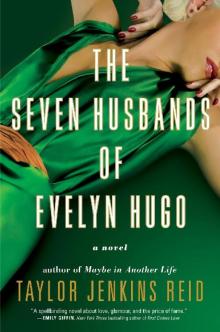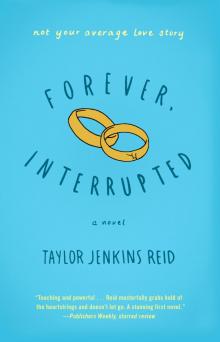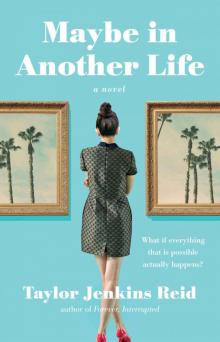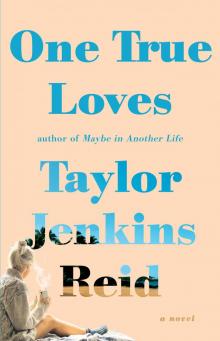- Home
- Taylor Jenkins Reid
The Seven Husbands of Evelyn Hugo Page 2
The Seven Husbands of Evelyn Hugo Read online
Page 2
SexyLexi89 says: Evelyn Hugo is maybe the most beautiful woman of all time. That shot in Boute-en-Train where she’s coming out of the water naked and the camera cuts to black right before you see her nipples? So good.
PennyDriverKLM says: All hail Evelyn Hugo for making blond hair and dark eyebrows THE LOOK. Evelyn, I salute you.
YuppiePigs3 says: Too skinny! Not for me.
EvelynHugoIsASaint says: This is a woman who has donated MILLIONS OF DOLLARS to charities for battered women’s organizations and LGBTQ+ interests, and now she’s auctioning off gowns for cancer research and all you can talk about is her eyebrow game? Seriously?
JuliaSantos@TheSpill reply to EvelynHugoIsASaint: This is a fair point, I guess. SORRY. In my defense, she started making millions by being a badass business bitch back in the ’60s. And she would never have had the clout to do that without her talent and beauty, and she never would have been as beautiful without DEM BROWS. But OK, fair point.
EvelynHugoIsASaint reply to JuliaSantos@TheSpill: Ugh. Sorry for being so bitchy. I skipped lunch. Mea culpa. For what it’s worth, Vivant won’t do half as well with this story as you would have. Evelyn should have chosen you.
JuliaSantos@TheSpill reply to EvelynHugoIsASaint: Right????? Who is Monique Grant anyway? BORING. I’m coming for her . . .
I’VE SPENT THE PAST FEW days researching everything I can about Evelyn Hugo. I was never a big film buff, let alone interested in any old Hollywood stars. But Evelyn’s life—at least the version on record as of now—is enough for ten soap operas.
There’s the early marriage that ended in divorce when she was eighteen. Then the studio-setup courtship and tumultuous marriage to Hollywood royalty Don Adler. The rumors that she left him because he beat her. Her comeback in a French New Wave film. The quickie Vegas elopement with singer Mick Riva. Her glamorous marriage to the dapper Rex North, which ended in both of them having affairs. The beautiful love story of her life with Harry Cameron and the birth of their daughter, Connor. Their heartbreaking divorce and her very quick marriage to her old director Max Girard. Her supposed affair with the much younger Congressman Jack Easton, which ended her relationship with Girard. And finally, her marriage to financier Robert Jamison, rumored to have at least been inspired by Evelyn’s desire to spite former costar—and Robert’s sister—Celia St. James. All of her husbands have passed away, leaving Evelyn as the only one with insight into those relationships.
Suffice it to say, I have my work cut out for me if I want to get her to talk about any of it.
After staying late at the office this evening, I finally make my way home a little before nine. My apartment is small. I believe the most appropriate term is teeny-tiny sardine box. But it’s amazing how vast a small place can feel when half of your things are gone.
David moved out five weeks ago, and I still haven’t managed to replace the dishes he took with him or the coffee table his mother gave us last year as a wedding present. Jesus. We didn’t even make it to our first anniversary.
As I walk in my front door and put my bag on the sofa, it strikes me again just how needlessly petty it was of him to take the coffee table. His new San Francisco studio came fully furnished courtesy of the generous relocation package offered with his promotion. I suspect he put the table in storage, along with the one nightstand he insisted was rightfully his and all of our cookbooks. I don’t miss the cookbooks. I don’t cook. But when things are inscribed to “Monique and David, for all your many years of happiness,” you think of them as half yours.
I hang up my coat and wonder, not for the first time, which question gets closer to the truth: Did David take the new job and move to San Francisco without me? Or did I refuse to leave New York for him? As I take off my shoes, I resolve once again that the answer is somewhere in the middle. But then I come back to the same thought that always stings afresh: He actually left.
I order myself pad thai and then get in the shower. I turn the water to nearly scalding hot. I love water so hot it almost burns. I love the smell of shampoo. My happiest place might just be under a showerhead. It is here in the steam, covered in suds, that I do not feel like Monique Grant, woman left behind. Or even Monique Grant, stalled writer. I am just Monique Grant, owner of luxury bath products.
Well after I’ve pruned, I dry myself off, put on my sweatpants, and pull my hair away from my face, just in time for the deliveryman to make his way to my door.
I sit with the plastic container, trying to watch TV. I attempt to zone out. I want to make my brain do something, anything, other than think about work or David. But once my food is gone, I realize it’s futile. I might as well work.
This is all very intimidating—the idea of interviewing Evelyn Hugo, the task of controlling her narrative, of trying to make sure she doesn’t control mine. I’m often inclined to overprepare. But more to the point, I’ve always been a bit like an ostrich, willing to bury my head in the sand to avoid what I don’t want to face.
So, for the next three days, I do nothing but research Evelyn Hugo. I spend my days pulling up old articles about her marriages and her scandals. I spend my evenings watching her old movies.
I watch clips of her in Carolina Sunset, Anna Karenina, Jade Diamond, and All for Us. I watch the GIF of her coming out of the water in Boute-en-Train so many times that when I fall asleep, it plays over and over in my dreams.
And I start to fall in love with her, just the littlest bit, as I watch her films. Between the hours of eleven P.M. and two A.M., while the rest of the world is sleeping, my laptop flickers with the sight of her, and the sound of her voice fills my living room.
There is no denying that she is a stunningly beautiful woman. People often talk about her straight, thick eyebrows and her blond hair, but I can’t take my eyes off her bone structure. Her jawline is strong, her cheekbones are high, and all of it comes to a point at her ever-so-swollen lips. Her eyes are huge but not so much round as an oversized almond shape. Her tanned skin next to her light hair looks beachy but also elegant. I know it’s not natural—hair that blond with skin that bronze—and yet I can’t shake the feeling that it should be, that humans should be born looking like this.
I have no doubt that’s part of the reason film historian Charles Redding once said that Evelyn’s face felt “inevitable. So exquisite, so nearly perfect, that when looking at her, you get the sense that her features, in that combination, in that ratio, were bound to happen sooner or later.”
I pin images of Evelyn in the ’50s wearing tight sweaters and bullet bras, press photos of her and Don Adler on the Sunset Studios lot shortly after they were married, shots of her from the early ’60s with long, straight hair and soft, thick bangs and wearing short-shorts.
There is a photo of her in a white one-piece, sitting on the shoreline of a pristine beach, with a large, floppy black hat covering most of her face, her white-blond hair and the right side of her face illuminated by the sun.
One of my personal favorites is a black-and-white shot from the Golden Globes in 1967. She is seated on the aisle, her hair pulled into a loose updo. She is wearing a light-colored lace gown with a deep scoop neckline, her cleavage controlled but on full display and her right leg escaping through the high slit of the skirt.
There are two men seated next to her, names lost to history, who are staring at her as she looks ahead at the stage. The man next to her is staring at her chest. The one next to him is staring at her thigh. Both of them seem enraptured and hoping to see the tiniest bit farther.
Maybe I’m overthinking that photo, but I’m starting to notice a pattern: Evelyn always leaves you hoping you’ll get just a little bit more. And she always denies you.
Even in her much-talked-about sex scene in Three A.M. from 1977, in which she writhes, reverse-cowboy style, on top of Don Adler, you see her full breasts for less than three seconds. It was rumored for years that the incredible box-office numbers for the film were because couples were going to see it multiple times.
&nb
sp; How does she know just how much to give and just how much of herself to withhold?
And does that all change now that she’s got something to say? Or is she going to play me the same way she played audiences for years?
Is Evelyn Hugo going to tell me just enough to keep me on the edge of my seat but never enough to truly reveal anything?
I WAKE UP A HALF hour before my alarm. I check my e-mails, including one from Frankie with the subject line “KEEP ME UPDATED,” yelling at me in all caps. I make myself a small breakfast.
I put on black slacks and a white T-shirt with my favorite herringbone blazer. I gather my long, tight curls into a bun at the top of my head. I forgo my contacts and choose my thickest black-framed glasses.
As I look in the mirror, I notice that I have lost weight in my face since David left. While I have always had a slim frame, my butt and face seem to be the first to pick up any extra weight. And being with David—during the two years we dated and the eleven months since we married—meant I put on a few. David likes to eat. And while he would get up in the early mornings to run it off, I slept in.
Looking at myself now, pulled together and slimmer, I feel a rush of confidence. I look good. I feel good.
Before I make my way out the door, I grab the camel cashmere scarf that my mother gave me for Christmas this past year. And then I put one foot in front of the other, down to the subway, into Manhattan, and uptown.
Evelyn’s place is just off Fifth Avenue overlooking Central Park. I’ve done enough Internet stalking to know she’s got this place and a beachfront villa just outside of Málaga, Spain. She’s had this apartment since the late ’60s, when she bought it with Harry Cameron. She inherited the villa when Robert Jamison died almost five years ago. In my next life, please remind me to come back as a movie star with points on the back end.
Evelyn’s building, at least from the outside—limestone, prewar, beaux arts style—is extraordinary. I am greeted, before even walking in, by an older, handsome doorman with soft eyes and a kind smile.
“How may I help you?” he says.
I find myself embarrassed even to say it. “I’m here to see Evelyn Hugo. My name’s Monique Grant.”
He smiles and opens the door for me. It’s clear he was expecting me. He walks me to the elevator and presses the button for the top floor.
“Have a nice day, Ms. Grant,” he says, and then disappears as the elevators close.
I ring the doorbell of Evelyn’s apartment at eleven A.M. on the dot. A woman in jeans and a navy blouse answers. She looks to be about fifty, maybe a few years older. She is Asian-American, with straight jet-black hair pulled into a ponytail. She’s holding a stack of half-opened mail.
She smiles and extends her hand. “You must be Monique,” she says as I hold out my own. She seems like the sort of person who genuinely delights in meeting other people, and I already like her, despite my strict promise to myself to remain neutral to everything I encounter today.
“I’m Grace.”
“Hi, Grace,” I say. “Nice to meet you.”
“Likewise. Come on in.”
Grace steps out of the way and beckons to invite me in. I put my bag on the ground and take off my coat.
“You can put it right in here,” she says, opening a closet just inside the foyer and handing me a wooden hanger.
This coat closet is the size of the one bathroom in my apartment. It’s no secret that Evelyn has more money than God. But I need to work at not letting that intimidate me. She’s beautiful, and she’s rich, and she’s powerful and sexual and charming. And I’m a normal human being. Somehow I have to convince myself that she and I are on equal footing, or this is never going to work.
“Great,” I say, smiling. “Thank you.” I put my coat on the hanger, slip it over the rod, and let Grace shut the closet door.
“Evelyn is upstairs getting ready. Can I get you anything? Water, coffee, tea?”
“Coffee would be great,” I say.
Grace brings me into a sitting room. It is bright and airy, with floor-to-ceiling white bookcases and two overstuffed cream-colored chairs.
“Have a seat,” she says. “How do you like it?”
“My coffee?” I ask, unsure of myself. “With cream? I mean, milk is fine, too. But cream is great. Or whatever you have.” I get hold of myself. “What I’m trying to say is that I’d like a splash of cream if you have it. Can you tell I’m nervous?”
Grace smiles. “A little. But you don’t have anything to worry about. Evelyn’s a very kind person. She’s particular and private, which can take some getting used to. But I’ve worked for a lot of people, and you can trust me when I say Evelyn’s better than the rest.”
“Did she pay you to say that?” I ask. I am trying to make a joke, but it sounds more pointed and accusatory than I intended.
Luckily, Grace laughs. “She did send my husband and me to London and Paris last year as my Christmas bonus. So in an indirect way, yeah, I suppose she did.”
Jesus. “Well, that settles it. When you quit, I want your job.”
Grace laughs. “It’s a deal. And you’ve got coffee with a splash of cream coming right up.”
I sit down and check my cell phone. I have a text from my mom wishing me luck. I tap to respond, and I am lost in my attempts to properly type the word early without auto-correct changing it to earthquake when I hear footsteps on the stairs. I turn around to see the seventy-nine-year-old Evelyn Hugo walking toward me.
She is as breathtaking as any of her pictures.
She has the posture of a ballerina. She’s wearing slim black stretch pants and a long gray-and-navy striped sweater. She’s just as thin as she ever was, and the only way I know she’s had work done on her face is because no one her age can look like that without a doctor.
Her skin is glowing and just the littlest bit red, as if it’s been rubbed clean. She’s wearing false eyelashes, or perhaps she gets eyelash extensions. Where her cheeks were once angular, they are now a bit sunken. But they have just a tint of soft rosiness to them, and her lips are a dark nude.
Her hair is past her shoulders—a beautiful array of white, gray, and blond—with the lightest colors framing her face. I’m sure her hair is triple-processed, but the effect is that of a gracefully aging woman who sat out in the sun.
Her eyebrows, however—those dark, thick, straight lines that were her signature—have thinned over the years. And they are now the same color as her hair.
By the time she reaches me, I notice that she is not wearing any shoes but, instead, big, chunky knit socks.
“Monique, hello,” Evelyn says.
I am momentarily surprised at the casualness and confidence with which she says my name, as if she has known me for years. “Hello,” I say.
“I’m Evelyn.” She reaches out and takes my hand, shaking it. It strikes me as a unique form of power to say your own name when you know that everyone in the room, everyone in the world, already knows it.
Grace comes in with a white mug of coffee on a white saucer. “There you go. With just a bit of cream.”
“Thank you so much,” I say, taking it from her.
“That’s just the way I like it as well,” Evelyn says, and I’m embarrassed to admit it thrills me. I feel as if I’ve pleased her.
“Can I get either of you anything else?” Grace asks.
I shake my head, and Evelyn doesn’t answer. Grace leaves.
“Come,” Evelyn says. “Let’s go to the living room and get comfortable.”
As I grab my bag, Evelyn takes the coffee out of my hand, carrying it for me. I once read that charisma is “charm that inspires devotion.” And I can’t help but think of that now, when she’s holding my coffee for me. The combination of such a powerful woman and such a small and humble gesture is enchanting, to be sure.
We step into a large, bright room with floor-to-ceiling windows. There are oyster-gray chairs opposite a soft slate-blue sofa. The carpet under our feet is thick, bright
ivory, and as my eyes follow its path, I am struck by the black grand piano, open under the light of the windows. On the walls are two blown-up black-and-white images.
The one above the sofa is of Harry Cameron on the set of a movie.
The one above the fireplace is the poster for Evelyn’s 1959 version of Little Women. Evelyn, Celia St. James, and two other actresses’ faces make up the image. All four of these women may have been household names back in the ’50s, but it is Evelyn and Celia who stood the test of time. Looking at it now, Evelyn and Celia seem to shine brighter than the others. But I’m pretty sure that’s simply hindsight bias. I’m seeing what I want to see, based on how I know it all turns out.
Evelyn puts my cup and saucer down on the black-lacquer coffee table. “Sit,” she says as she takes a seat herself in one of the plush chairs. She pulls her feet up underneath her. “Anywhere you want.”
I nod and put my bag down. As I sit on the couch, I grab my notepad.
“So you’re putting your gowns up for auction,” I say as I settle myself. I click my pen, ready to listen.
Which is when Evelyn says, “Actually, I’ve called you here under false pretenses.”
I look directly at her, sure I’ve misheard. “Excuse me?”
Evelyn rearranges herself in the chair and looks at me. “There’s not much to tell about me handing a bunch of dresses over to Christie’s.”
“Well, then—”
“I called you here to discuss something else.”
“What is that?”
“My life story.”
“Your life story?” I say, stunned and trying hard to catch up to her.
“A tell-all.”
An Evelyn Hugo tell-all would be . . . I don’t know. Something close to the story of the year. “You want to do a tell-all with Vivant?”
“No,” she says.
“You don’t want to do a tell-all?”
“I don’t want to do one with Vivant.”
“Then why am I here?” I’m even more lost than I was just a moment ago.

 Daisy Jones & the Six
Daisy Jones & the Six The Seven Husbands of Evelyn Hugo
The Seven Husbands of Evelyn Hugo Malibu Rising
Malibu Rising Malibu Rising: A Novel
Malibu Rising: A Novel After I Do
After I Do Forever, Interrupted
Forever, Interrupted Maybe in Another Life
Maybe in Another Life One True Loves
One True Loves